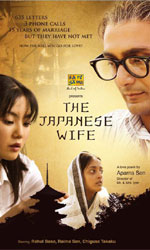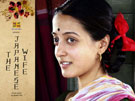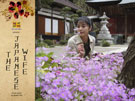|
|

|
|


EDITOR'S PICK
Rating: **
The final lap in this lyrical but contrived tale of unfufilled love shows two
women coming together after the tragic death of the man they both loved. One,
the Japanese wife of the title, the other a silent widow of meagre means.
By then it`s too late. "The Japanese Wife" has lost its claims to its
director`s fame.
This story of a long-distance `marriage` between a Bengali bhadra-lok from rural
Bengal Snehmoy (Rahul Bose) and his Japanese pen-pal Miyage (Chigusa Takaku)
suffers from an incurable disease known as Inherent Silliness. Based on a true
story by Kunal Basu, this is the ultimate non-romance between two people who
thoroughly deserve each other.
They`re both so annoying and outdated in their naivete, you see! The couple
married to each other for over 15 years never meets and barely speaks to each
other on the phone a few times (talk about phoney relationships, this one takes
the cake). When Miyage falls ill in Japan Snehmoy goes to the doctor in Kolkata
with her medical reports. The doc`s expression when he hears why the patient
can`t come personally to be examined is exactly the way we feel about this
long-distance marriage.
Aparna Sen, in what is arguably her most disastrous film to date, intersperses
the over-sweet ridiculously idealistic relationship with quaint post-picture
images from Snehmoy`s rural home life with his aunt (Moushumi) and widow (Raima
Sen) who moves into the schoolteacher-hero`s home with her son. Snatches of
changing times such as Bipasha sizzling to "Beedi jalayle" on
television remind us of how outrageously old-fashioned the basic storyline is.
While Rahul`s Japanese connection makes you want to run and cover your face in a
kimono, the actor`s rapport with the widow`s son (Rudranil Ghosh) conveys a
natural warmth and grace.
Aparna Sen has always shown a keen eye for visual detail. The scenes from
Snehmoy`s home life, the architectural details, the scenic landscape, incidental
characters encountered in the toasted-brown lanes, and the boats riding the
swelling rivers are done with heartwarming tenderness. Full credit to
cinematographer Anay Goswami for using the screen space to create picture-post
card scenes of rural Bengal echoing images from Satyajit Ray`s "Pather
Panchali".
The art-direction, sound and most specially the composition of the frames once
again shows Aparna Sen`s glorious mastery over visual detailing and her skill as
a celluloid storyteller so evident in her earlier works.
This time Aparna Sen is let down by the basic implausibility of the material.
What could have been a poignant and haunting tale of love, understanding and
marriage between two people from different cultures and countries ends up being
just a misconstructed series of verbal exchanges on the soundtrack between Rahul
Bose and the Japanese actress whose individual accents are as grating on our
nerves as any put-on accent we`ve ever heard in cinema.
Bose, who has repeatedly proved himself a skilled actor, is unable to take his
character to a level beyond the irritating. What is supposed to be moving and
emotional often turns out to be unintentionally laughable. Watch Rahul
masturbating frantically in a boat after he promises his chitti-biwi from Japan
to remain sexually faithful to her. This is Rahul`s second masturbation scene on
screen after Dev Benegal`s "English August". The first time his
character was bored. This time he`s just desperate. So are we.
To keep a straight face while the characters talk to each other in thick accents
about love and togetherness without ever meeting (or mating). This is stretching
the imagination. Sorry, it just doesn`t work.
As for the long kite-flying sequence it puts you off kites forever. Sorry,
Hrithik and Barbara.
Rahul Bose`s vast abilities to get into character here fight a losing battle.
His performance never goes beyond the accent. Raima Sen is as usual, lovely and
in-character. Wonder why she continues to be sidelined! And it`s a pleasure to
watch Moushumi Chatterjee return as Rahul`s goodhearted but scheming aunt. But
as Rishi Kapoor always says about his performances in failed films, `Faiyda kya
hai?` (What`s the use)
If you are a fan of Aparna Sen`s work (as I am) you would be deeply disappointed
by her descent into this self-important but frustrating film about a couple
which deserves each other for all the wrong reasons. Arjun Sablok did
long-distance love much better with Hrithik Roshan and Esha Deol in "Na Tum
Janon Na Hum".
Konkona Sen Sharma believes that "The Japanese Wife" is Rahul Bose's best film so far. Read More
This is a haunting but improbable love story involving three shy people: Snehamoy Chatterjee, an Arithmetic teacher in a school in the interiors of riverine West Bengal; Miyage the Japanese girl who became his wife through a strange sequence of letters, and Sandhya, a widow forced by circumstances to take refuge in his home.
It had all begun when Snehamoy was a student in Serampore College, living in a hostel and preparing for his BSc examination. Too shy to make friends with his rowdy classmates, he had sent off a letter to a name found in a magazine under ‘pen friends’. The answer had arrived a month later resulting in an abiding friendship between two people who did not know each other’s tongues and were forced to communicate with the aid of dictionaries in a foreign language – English – often with hilarious results.
It would probably have continued in this vein if it hadn’t been for Snehamoy’s aunt’s God-daughter Sandhya.
Sandhya is brought to their house because Mashi, the widowed aunt who had brought Snehamoy up, is trying to find a prospective bride for her nephew. When Snehamoy writes to Miyage about her as he does about every important and unimportant event, a letter arrives that changes the course of his life.
In the letter Miyage has offered herself to him as his bride. If he agrees, they will be married. After weighing the matter over for a month, Snehamoy finally agrees to Miyage’s proposal. Tokens are exchanged between the two, making them man and wife – at least in their own eyes. She sends him a silver wedding ring with her name engraved on it. He sends her a pair of conch-shell bangles and a packet of vermillion powder – the traditional signs of marriage among Bengali women.
His aunt, outraged at first, comes in time to accept her absentee niece in-law in the same way that the neighbours’ taunts and jibes give way to an acceptance of the Arithmetic teacher’s Japanese wife. She sends him photographs, gifts…once even a huge box of traditional Japanese kites.
He sends her rain-drenched champak blossoms carefully wrapped in plastic with the hope that they will retain their fragrance until they reach her.
In time, the urge of a lonely letter writer gives way to the fullness of a lasting bond. Yet, even after fifteen years of marriage, the two have not met! It is always a question of not having enough money or Miyage’s sick mother or Snehamoy’s Mashi’s health. But their physical absence in each other’s lives never comes in the way of their sense of belonging as a couple. Snehamoy feels every inch a married man and Miyage takes her responsibility as a wife very seriously, admonishing her husband for not wearing socks in cold weather or tying an Ema at a shrine to pray for him when he is ill.
But, soon after the arrival of the kites on their fifteenth wedding anniversary, there is another arrival in Snehamoy’s home, subtly changing the course of his life a second time. Sandhya comes back as a widow with an eight year-old son in tow, and no one to turn to after her mother’s death except Snehamoy’s Mashi – her God-mother. Even though Sandhya never crosses his path, she takes up the reins of the household in her own unobtrusive way. Snehamoy’s room which had always been a mess of papers, unmade bed, discarded clothes and over-spilling ashtrays, is now tidy and fresh-smelling when he returns from school with his clothes folded neatly on the clotheshorse.
With Sandhya Snehamoy discovers a bond of domesticity as they gradually start sharing household chores. With her son Paltu he discovers the joys of fatherhood. Paltu becomes his pet and together they organize a fantastic kite fight in their village between the Japanese kites sent by Miyage and their locally made rivals.
Yet Snehamoy remains Miyage’s devoted husband at heart. When Miyage falls sick and has to leave her home to live with her brother, Snehamoy is frantic with worry. He would have flown to Japan had he the money to do so. As it is, he takes six months’ leave (without pay!) from his school and spends agonizing days consulting a range of doctors with his wife’s symptoms. His proximity with Sandhya grows as well, as he becomes aware of her tragedy – living the lonely life of a widow. The shy school teacher is caught between the pull of his marriage – a long standing intimacy devoid of domesticity -- and another undefined relationship that offers a comforting domesticity without any possibility of intimacy – thus becoming an unwitting partner to two solitary women.
As days pass by and Miyage’s health worsens, it becomes clear that Snehamoy will need to visit an oncologist in Calcutta to get a proper assessment of his wife’s condition. A storm strikes as he makes his way over to the city and he returns disheartened and severely drenched. He tries to call Miyage on a local phone but a poor connection comes in the way of a proper conversation.
He falls sick with pneumonia and the flooding makes it impossible for him to receive proper treatment. The fever rages while their village remains marooned in the grip of a tormented Bay of Bengal. The local homeopath prescribes sweet white pills that neither bring down the temperature nor ease the labored breathing. Sandhya sits by his bedside pressing cold compresses on his forehead and massaging hot oil into his chest while his aunt prays fervently at the family shrine and the boy flits nervously in and out of the room. The postman had come knocking once the ferry service was able to bring in the mail, but Miyage’s letter, which the boy had pressed into the patient’s hand, remains unopened. Snehamoy’s fevered brain imagines his wife’s letter: I am right there beside you Snehamoy…can you not feel my hand on your forehead…?
Far from his wife and desperately worried over her health, Snehamoy’s life hangs by the thread as he is tended by Sandhya, just as any beloved husband would be by a loving wife.
Will the widow find her solace with Snehamoy? Or, just as in their letters, will life finally unite Snehamoy and Miyage as husband and wife?




